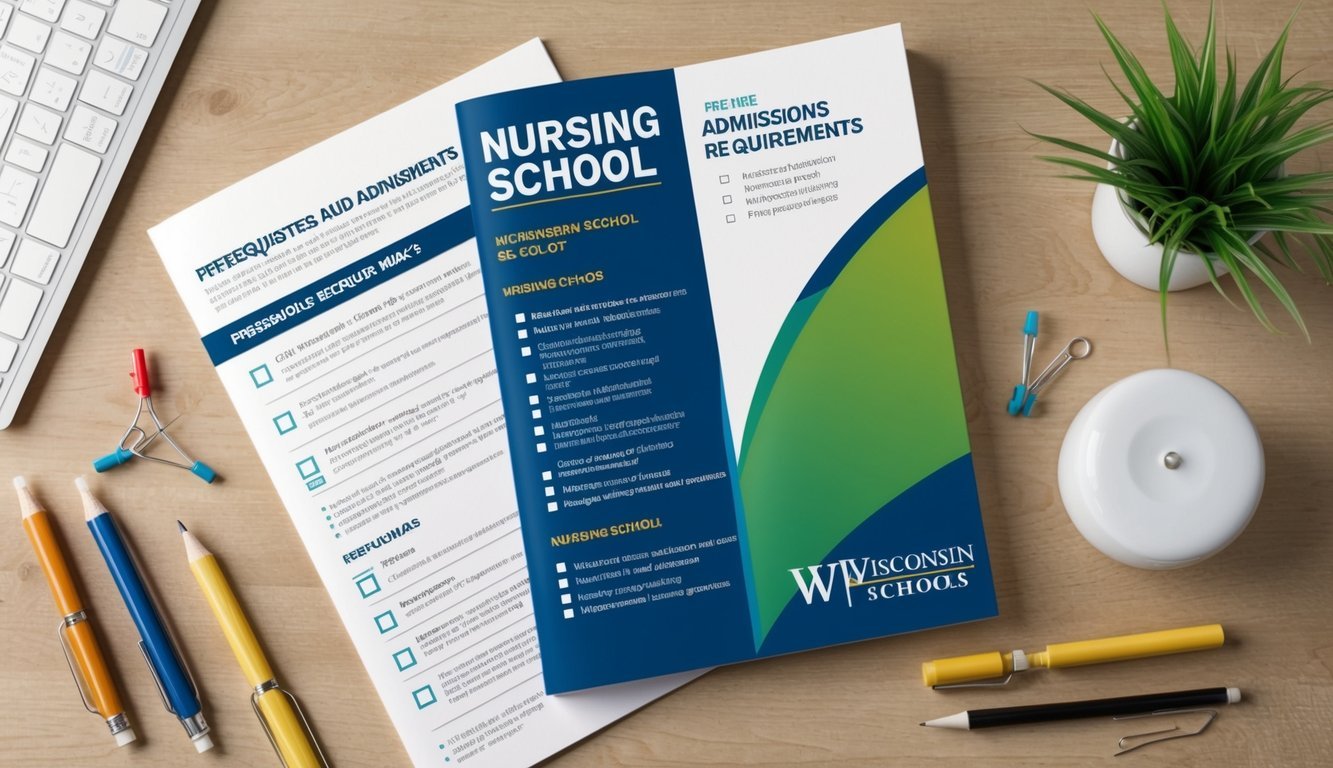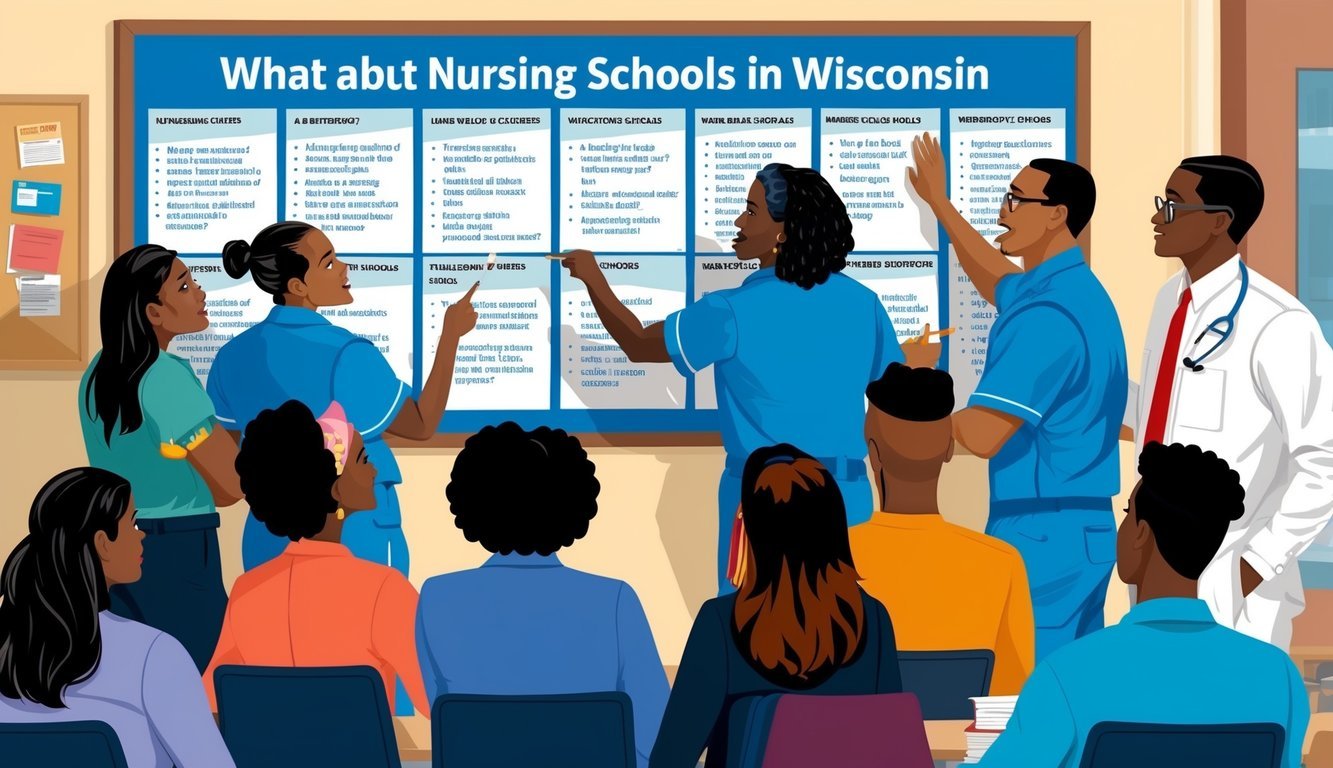Nursing schools in Wisconsin offer various programs designed to prepare you for a rewarding career in healthcare.
With options ranging from Associate Degrees in Nursing (ADN) to Bachelor of Science in Nursing (BSN) and beyond, you can find a program that fits your goals.
These schools not only focus on academic excellence but also provide valuable clinical experiences to help you succeed in your nursing career.
As you explore nursing education in this state, you’ll discover that many institutions offer financial aid and scholarships, making your educational journey more affordable.
The landscape of nursing is evolving with new innovations in education, ensuring you receive the latest training and skills necessary for today’s healthcare environment.
In addition to rigorous academics, nursing schools in Wisconsin emphasize professional development, preparing you to adapt in a fast-changing field.
With so many options, you’re likely to find a program that meets your needs while leading you toward a successful nursing career.
Key Takeaways
- Wisconsin offers various nursing programs, including BSN and ADN options.
- Financial aid and scholarships are available to help with educational costs.
- Nursing schools focus on innovative education and professional development.
Overview of Nursing Schools in Wisconsin
Wisconsin offers a variety of nursing programs to prepare you for a career in healthcare.
You can choose from different types of degrees that cater to your career goals and interests.
Many key institutions provide accredited programs with strong reputations.
Range and Types of Programs
In Wisconsin, you can find several nursing programs, including Associate Degree in Nursing (ADN) and Bachelor of Science in Nursing (BSN).
The ADN typically takes about two years to complete, whereas the BSN usually takes four years.
Each program prepares you for different roles in nursing practice.
Programs vary in focus, covering essential topics such as patient care, medical ethics, and health assessment.
For those seeking advanced education, several schools offer Master of Science in Nursing (MSN) and Doctor of Nursing Practice (DNP) degrees.
Key Institutions and Their Offerings
Some notable institutions for nursing education in Wisconsin include:
| Institution | Type | Notable Features |
|---|---|---|
| University of Wisconsin-Madison | BSN, MSN, DNP | One of the oldest nursing schools, strong reputation |
| Marquette University | BSN, MSN, PhD | Low student-to-faculty ratio, extensive alumni network |
| Wisconsin Lutheran College | ADN, BSN | Offers a Christian perspective in nursing education |
| Edgewood College | BSN, MSN | Focus on liberal arts education alongside nursing |
These schools provide well-rounded education, practical experiences, and specialized training.
State Accreditation and Approval
In Wisconsin, nursing schools must be accredited to ensure quality education.
The Commission on Collegiate Nursing Education (CCNE) and the Accreditation Commission for Education in Nursing (ACEN) provide this accreditation.
The state ensures that programs meet specific standards which is critical for licensing.
You can find a range of nursing schools with accreditation status listed on websites like RN Careers or Nursing Schools Almanac.
Checking the accreditation status before applying will help you make informed decisions about your education and future career.
Admissions and Prerequisites

Gaining admission to nursing programs in Wisconsin involves understanding specific application processes and requirements.
Knowing the differences in tuition rates for in-state and out-of-state students is crucial.
Additionally, the NCLEX-RN pass rates can be a strong indicator of a program’s quality.
Understanding the Application Process
When applying to nursing schools in Wisconsin, each program may have unique requirements.
Generally, you will need to submit an application form, official transcripts, and letters of recommendation.
Most programs require a minimum cumulative GPA, often around 2.75 or 2.8.
Additionally, some schools may ask you to complete an interview as part of the process.
Familiarize yourself with each school’s specific prerequisites to strengthen your application.
You can find more information about the application process on nursing school websites.
Comparing In-State and Out-of-State Tuition
Tuition rates can vary significantly between in-state and out-of-state students.
Many schools in Wisconsin offer lower rates for residents.
Here’s a general comparison:
| Tuition Type | Estimated Cost per Year |
|---|---|
| In-State Tuition | $10,000 – $15,000 |
| Out-of-State Tuition | $20,000 – $30,000 |
These figures can change based on the program and school.
Always check the school’s website for the most accurate information.
Some schools may also have scholarships to help offset costs.
Learn more about in-state versus out-of-state tuition rates at the Registered Nursing Organization.
Importance of NCLEX-RN Pass Rates
The NCLEX-RN exam is essential for becoming a registered nurse.
A school’s NCLEX-RN pass rate can reflect the quality of its nursing program.
High pass rates are generally an indicator that the program effectively prepares students for the exam.
Most nursing programs in Wisconsin aim for a pass rate of 90% or higher.
Schools often publish this information on their websites.
You should consider these statistics when choosing a program, as they can influence your future career as a registered nurse.
Financial Aid and Scholarships
When pursuing a nursing program in Wisconsin, understanding financial aid and scholarship options is crucial.
These resources can significantly reduce your education costs, making nursing school more accessible.
Below, you’ll find details about the types of financial assistance available and guidance on navigating scholarship opportunities.
Types of Financial Assistance
Financial assistance can come in various forms, such as grants, loans, and work-study programs.
Here’s a brief overview:
| Type | Description |
|---|---|
| Grants | Usually need-based funds that do not require repayment. Examples include Federal Pell Grants and state grants. |
| Loans | Borrowed money that must be repaid with interest. Federal Direct Loans are a common option for students. |
| Work-Study | Part-time jobs offered by schools to help students earn money for tuition. This may include roles on campus related to nursing. |
Many nursing schools in Wisconsin provide information about financial aid through their websites or financial aid offices.
It’s important to complete the FAFSA to determine eligibility for federal and state aid.
Navigating Scholarship Opportunities
Scholarships are excellent resources that do not require repayment.
Here are steps to find and apply for nursing scholarships:
-
Research: Visit school websites and external organizations for available scholarships. For instance, the University of Wisconsin-Madison offers scholarships with specific criteria.
-
Application Process: Each scholarship has its own application process and deadlines. Be sure to check them early. Some scholarships may require essays or letters of recommendation.
-
Stay Organized: Create a list of scholarships you’re interested in, along with their due dates and requirements.
Remember, scholarships can significantly ease your financial burden, so take the time to apply wisely.
Career and Professional Development

In Wisconsin, advancing your nursing career involves understanding specific requirements and exploring various specialties.
This section outlines the essential qualifications for advanced practice, highlights different nursing paths, and discusses the job outlook in the state.
Advanced Practice Registered Nurse (APRN) Requirements
To become an Advanced Practice Registered Nurse in Wisconsin, you need to meet certain qualifications.
You must hold a Master of Science in Nursing (MSN) or a Doctor of Nursing Practice (DNP) degree.
Additionally, you must obtain national certification in your chosen specialty and apply for an APRN license through the Wisconsin Department of Safety and Professional Services.
Your options include Nurse Practitioners (NPs) and Nurse Anesthetists (CRNAs).
NPs focus on comprehensive patient care, while CRNAs specialize in anesthesia delivery.
Both roles require ongoing education to maintain certification and stay updated on best practices.
For more details on APRN requirements, you can visit the Wisconsin Nursing Board.
Nursing Specialties and Career Paths
The nursing field in Wisconsin offers numerous specialties, allowing you to pursue your interests.
Some of the popular nursing specialties include:
- Public Health Nursing: Focus on community health and addressing health disparities.
- Pediatrics: Provide care to infants and children.
- Geriatrics: Specialize in caring for older adults.
- Critical Care: Work in high-stakes environments like ICU units.
- Nurse Midwifery: Support women during childbirth.
By choosing a specialty, you can tailor your career to align with your passions and the needs of the healthcare system.
Consider the various pathways available and how they fit into Wisconsin’s nursing shortage, which calls for skilled professionals across all specialties.
Job Outlook for Nurses in Wisconsin
The job outlook for nurses in Wisconsin is promising.
According to recent data, there is a growing demand for nurses due to an aging population and increased healthcare needs.
The U.S. Bureau of Labor Statistics predicts a 7% growth in nursing jobs nationwide from 2019 to 2029.
In Wisconsin, this demand translates into numerous opportunities across various settings such as hospitals, clinics, and community health organizations.
You can expect competitive salaries and benefits, making nursing a stable career choice.
For more insights on nursing job opportunities, visit Job Center of Wisconsin.
Innovations in Nursing Education
Nursing education in Wisconsin has seen significant advancements.
These changes aim to improve training and prepare students for the complex healthcare environment.
Innovations focus on practical, hands-on experience that enhances learning outcomes.
Healthcare Simulation Centers
Healthcare simulation centers provide students with realistic clinical experiences.
These centers use advanced technology to create lifelike medical scenarios.
At institutions like the University of Wisconsin-Madison and University of Wisconsin-Eau Claire, students can practice skills in a safe environment.
They learn to assess and respond to patient needs without risk.
Advantages of Simulation Centers:
- Realistic Scenarios: Students encounter various medical emergencies.
- Immediate Feedback: Instructors provide real-time evaluations.
- Collaboration: Students work in teams, mirroring real healthcare settings.
Notable Programs:
-
Fox Valley Technical College
Focuses on developing clinical judgment through simulation. -
Carroll University
Offers innovative training methods with advanced mannequins. -
Maranatha Baptist University
Integrates technology in nursing practice.
These centers play a crucial role in preparing nursing students for their future careers, making them effective practitioners in real-world healthcare settings.
Frequently Asked Questions

Nursing schools in Wisconsin have many features that potential students should consider.
This section addresses important questions about accreditation, program options, completion times, rankings, affordability, and online coursework available in the state.
What accreditation should I look for in a Wisconsin nursing school?
When choosing a nursing school, you should look for accreditation from recognized organizations.
In Wisconsin, schools may be accredited by the Commission on Collegiate Nursing Education (CCNE) or the Accreditation Commission for Education in Nursing (ACEN).
Which institutions in Wisconsin offer direct admission for nursing programs?
Some schools in Wisconsin provide direct admission to nursing programs.
The University of Wisconsin-Madison and the University of Wisconsin-Eau Claire are among those that offer this option, allowing students to secure a place in the nursing program before starting their studies.
What are the completion times for different nursing degree programs in Wisconsin?
Completion times vary based on the type of nursing degree you pursue.
Typically, an Associate Degree in Nursing (ADN) takes about 2 years, while a Bachelor of Science in Nursing (BSN) program usually requires 4 years.
Accelerated programs can offer faster pathways for those already holding a degree.
How does the University of Wisconsin’s nursing program rank among other schools?
The University of Wisconsin-Madison’s nursing program is highly regarded.
It is consistently ranked among the top nursing schools in the country due to its strong curriculum, dedicated faculty, and comprehensive clinical training experiences.
What are the most affordable nursing programs available in Wisconsin?
Affordability can vary by school.
Some of the most cost-effective options include the University of Wisconsin-Milwaukee and local community colleges, where tuition tends to be lower than at private institutions.
Are there any nursing programs in Wisconsin that offer online coursework?
Yes, several nursing programs in Wisconsin provide online coursework.
Schools like the University of Wisconsin-Eau Claire and the University of Wisconsin-Milwaukee offer flexible online options for students looking to balance education with other commitments.

